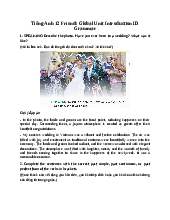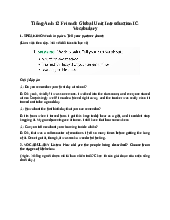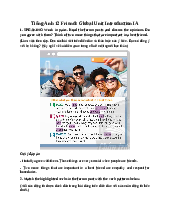





Preview text:
Tiếng Anh 12 Friends Global Unit Introduction IB Grammar
1. SPEAKING Work in pairs. Look at the list of annoying habits. Which annoys you the most?
(Làm việc theo cặp. Nhìn vào danh sách những thói quen khó chịu. Điều nào làm bạn khó chịu nhất?) Gợi ý đáp án
For me, the one that bothers me the most is when someone always talks about
himself/herself. It makes the conversation one-sided and can be quite tiring.
2. Read and listen to the dialogue. Which of the faults in exercise 1 does Andy
complain about? Do you agree with the advice Jessica gives Andy? Why?/Why not?
(Đọc và nghe đoạn hội thoại. Andy phàn nàn về lỗi nào trong bài tập 1? Bạn có đồng ý
với lời khuyên mà Jessica dành cho Andy không? Tại sao tại sao không?) Gợi ý đáp án
- Andy complains about someone who always talks about himself / herself.
- I agree with the Jessica’s advice: “Next time you see him, tell him that it annoys you. I'll
tell him if you want because it irritates me too! ”
- I agree with the advice because open communication is often a key factor in resolving
conflicts or addressing concerns in a relationship. It allows for understanding each other's
perspectives and finding ways to improve the friendship.
3. Read the Learn this! box. Match the highlighted sentences (1-7) in exercise 2 with the rules (a−g).
(Đọc phần khung Learn this! Nối các câu được đánh dấu (1-7) trong bài tập 2 với các quy tắc (a−g).) Gợi ý đáp án 1. f 2. a 3. b 4. d 5. e 6. c 7. g
4. Complete the text with the correct present simple or continuous form of the verbs
in brackets. More than one answer may be possible.
(Hoàn thành đoạn văn với dạng hiện tại đơn hoặc tiếp diễn chính xác của động từ trong
ngoặc. Có thể có nhiều hơn một câu trả lời.) Gợi ý đáp án 1. text
2. are always using 3. are going out 4. am not using 5. am revising 6. start 7. are trying 8. helps
5. Read the Learn this! box. Complete the rules with will or be going to. Use the
underlined examples from the dialogue in exercise 2 to help you.
(Đọc phần khung LEARN THIS! Hoàn thành các quy tắc với will hoặc be going to. Hãy
sử dụng những ví dụ được gạch chân trong đoạn hội thoại ở bài tập 2 để giúp bạn.) Gợi ý đáp án a. be going to b. will c. be going to d. will e. will
6. PRONUNCIATION Falling and rising intonation patterns
(PHÁT ÂM Các ngữ điệu lên và xuống)
As in a statement, our voice goes down at the end when we are making a Wh-question. It
goes up when we are making a Yes-No question.
(Giống như trong một câu trần thuật, giọng của chúng ta sẽ trầm xuống ở cuối khi chúng
ta đặt câu hỏi Wh-. Nó tăng lên khi chúng ta đặt câu hỏi Yes/No.)
7. SPEAKING Work in pairs. Ask and answer the following questions, using the
proper intonation patterns.
(Làm việc theo cặp. Hỏi và trả lời các câu hỏi sau, sử dụng các mẫu ngữ điệu thích hợp.) Gợi ý đáp án
A: Do your friends have any annoying habits?
B: Oh, definitely! My friend always talks too loudly on the phone.
A: What do you do if someone has habits that are annoying? ↓
B: Well, I usually try to talk to them about it and see if we can find a compromise.
A: Do you often enjoy your school holiday with your friends?
B: Absolutely! We usually plan some fun activities together, like going to the beach or having a movie night.
A: What plans do you have for the next school holiday? ↓
B: I haven't decided yet, but I'm thinking about taking a short trip with a few friends.


